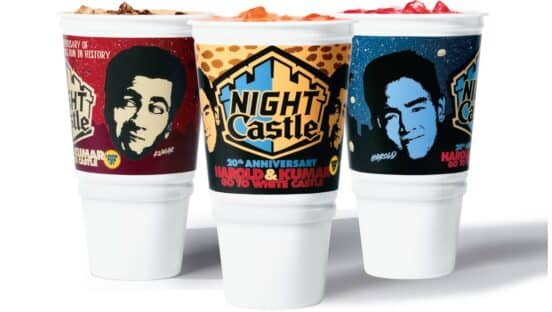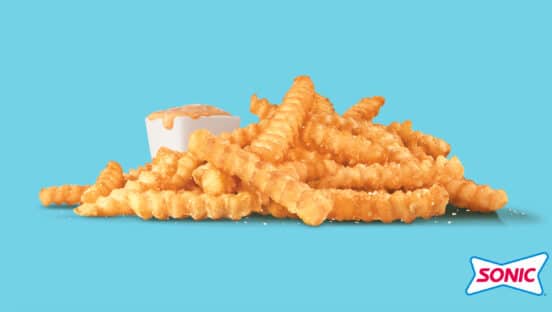Tricon
Global Restaurants, Inc. (NYSE:YUM) reported ongoing
operating earnings of $120 million, or $0.81 per share for
the fourth quarter ended December 30, 2000. Full year, ongoing
operating earnings were $444 million, or $2.98 per share,
a 16% increase. Additionally, in the quarter, Tricon took
unusual charges totaling $36 million, principally related
to AmeriServe, wage and hour litigation, and costs related
to joint venture formation. The fourth quarter and full
year includes the benefit of an extra reporting week.
“We were pleased to deliver on target fourth quarter
profit results, reflecting solid performance by Pizza Hut
and our International business along with strong restaurant
margins,”says David Novak, Chairman and CEO. “For
the full year 2000, we achieved 16% growth in ongoing operating
earnings per share, despite a decline of 2% in U.S. blended
same-store sales. Strong performance by our International
business was a key driver, as were significant reductions
in overhead, interest expense and the ongoing operating
tax rate.
“Our No. 1 challenge is to improve sales trends at Taco
Bell and KFC in 2001. We have new leadership in place and
are starting to execute new strategies, including an intensified
focus on restaurant operations. For 2001, we continue to
expect solid international growth, combined with sequential,
quarterly sales improvement in our U.S. business, which
will result in ongoing operating EPS of $3.18 to $3.22.
“Going forward, we will continue to report on five key
areas of our business that we believe are important in measuring
our growth and progress in becoming a unique restaurant
company. During 2000 we made substantial progress in all
areas except for U.S. blended same-store sales growth.
International Expansion was strong as we opened a record 929
traditional International restaurants led by our two global
brands, KFC and Pizza Hut. U.S. Blended Same-store Sales declined
2%. Through our portfolio of three brands, the goal is to
grow U.S. blended same-store sales 2% to 3% consistently each
year. As previously communicated, we expect our first quarter
2001 U.S. blended same-store sales to be down 2% to 3%. We
continue to expect progress each quarter thereafter, building
towards 2% to 3% growth in the second half.
Our progress, quarter-to-date, supports this expectation.
Multibranded Restaurant Growth was significant, as we expanded
multibranding to almost 1,200 restaurants worldwide by year-end
from only 745 locations last year. The various combinations
of our
three leading brands now represent $1 billion in annual system
sales and make Tricon the largest multibranded restaurant
operator in the world.
Franchise Fees increased to nearly $800 million, as our
franchise partners continued to invest in expanding new
restaurants worldwide. We expect to complete our refranchising
program during 2001, which will further enhance this revenue
stream. As previously communicated, we are proactively working
with our Taco Bell franchisees who are experiencing varying
degrees of financial difficulties.
Cash Flow generated was about $850 million. This allowed us
to invest in 370 new company restaurants, upgrade and remodel
289 company restaurants and purchase over $200 million of
our shares. Our return on invested capital improved to better
than 18%, which we believe leads the industry category and
is up 10 percentage points since our spin-off in 1997.
“In the three years since Tricon was spun-off, Operating
EPS has more than doubled, net debt has been reduced by
$2.1 billion, restaurant margin improved over 3 full points
and system sales have increased by 8%.
“As a result of Tricon’s strong cash flow and financial
condition, we are pleased to announce that the Board has
authorized up to an additional $300 million share repurchase
program to be executed over the next two years. The Board’s
action demonstrates their confidence in Tricon’s business
outlook for 2001 and beyond.”
Repurchases of Tricon common stock under the program may
be made from time to time in open market and/or privately
negotiated transactions, and will be subject to market conditions
and other factors.
International Expansion and Business Performance
A record 929 new traditional restaurants were opened during
the year, including 702 new restaurants opened by our franchise
and affiliated partners. The strong international expansion
included significant openings in China, Japan, Korea, Mexico,
New Zealand, Thailand and the U.K. The KFC and Pizza Hut
brands were the key drivers of our international expansion
as Tricon now has over 5,900 KFC restaurants and over 4,000
Pizza Hut restaurants outside the U.S. For 2001, the company
expects comparable levels of new restaurant expansion.
For the quarter, system sales were up 6% before a 5 percentage
point reduction due to foreign currency translation. Same
store sales growth was achieved in these key countries during
the quarter: China, Korea, Mexico, and the U.K., as well
as the KFC business in Australia. Ongoing operating profit,
in U.S. dollars, increased by 14% on top of 29% growth last
year, driven by system restaurant expansion and an extra
reporting week.
For the full year, the international business continued
to deliver strong growth with system sales of $7.6 billion,
up 8% for the year before a 2 percentage point reduction
due to foreign currency translation. Same store sales growth
and a strong 6% net increase in system restaurants fueled
this growth. Ongoing operating profit, in U.S. dollars,
increased 16% to $309 million for the year. Going forward,
we continue to expect the international business to grow
ongoing operating profits at about 15% per year, prior to
any significant changes in foreign currency.
U.S. Blended Same-store Sales and Business Performance
For the fourth quarter, U.S. system sales increased 2%.
Traditional restaurant growth and the benefit of an extra
reporting week were partially offset by a 3% decline in
U.S. company blended same-store sales. Pizza Hut’s strong
same-store sales performance in the fourth quarter was more
than offset by lower sales at Taco Bell and KFC. In the
fourth quarter, ongoing operating profit declined 9%, as
additional expenses related to our Taco Bell franchise business
and lower same-store sales more than offset favorable commodity
costs and the benefit of an extra reporting week.
For the full year, U.S. system sales of $14.5 billion were
flat versus 1999, as net growth in traditional restaurant
locations was offset by a 2% decline in same-store sales.
During the year the system added 509 new traditional restaurants
in the U.S. prior to closures. The growth in new restaurant
locations was driven primarily by expansion of our KFC franchise
partners, including new multibranded restaurants. The decline
in same-store sales, additional expenses related to our
Taco Bell franchise business, and the impact of refranchising
during the year were key factors in the U.S. ongoing operating
profit decline of 9% versus 1999.
For 2001, the company expects U.S. blended same-store sales
growth of about 2%, led by solid performance at Pizza Hut
and improving results at Taco Bell and KFC. U.S. ongoing
operating profit is expected to be down slightly versus
2000, including the negative impact from refranchising.
Multibranded Restaurant Growth
In 2000, the number of multibranded restaurant locations
increased by 450, to almost 1,200 system-wide by year-end.
Tricon’s franchise partners are key investors in this concept
as they now operate over 700 of the nearly 1,200 system-wide
restaurants. Going forward, multibranding will be a key
driver of U.S. restaurant growth. The company and its franchise
and affiliated partners currently operate nearly 1,100 multibranded
restaurants in the U.S. and over 100 outside the U.S. This
includes over 600 KFC and Taco Bell combination restaurants,
400 Taco Bell and Pizza Hut combination restaurants and
over 100 KFC and Pizza Hut combination restaurants. For
2001, Tricon expects continued rapid expansion of the multibranding
concept, with an additional 450 to 500 new multibranded
locations.
Franchisee Business Growth
For the full year, franchise fees increased 9% to $788
million from our three brands worldwide. Franchise restaurant
growth, through a combination of new restaurant expansion
and the company’s refranchising program, fueled this growth.
The company expects to substantially complete its refranchising
program during 2001. For 2001, the company expects that
its global franchise and affiliated partners will continue
to expand with new restaurants at a rate comparable to 2000
and that global franchise fees will grow to over $835 million
in 2001.
Cash Flow and Returns
Tricon generated about $850 million of cash flow prior
to investment in 2000. The company invested in a number
of areas, including 370 new restaurants; 227 international
and 143 in the U.S. The company also invested significantly
in upgrading and remodeling existing restaurants and the
program continues to progress on plan. Additionally, Tricon
repurchased over $200 million of its own shares and reduced
net debt by $79 million. As previously disclosed, Tricon
spent significant dollars to quickly resolve the AmeriServe
situation and ensure the continuity of distribution to all
U.S. restaurants. For 2001, the company expects cash flow
generated to invest will exceed $900 million.
The company’s return on invested capital improved to over
18% in 2000. This measure has shown steady and consistent
improvement from the 8% level at spin-off in 1997. It is
now at a level which the company believes leads the QSR
category.
Financial Progress
For the fourth quarter, ongoing restaurant margin increased
to 15.0% from 14.4% a year ago. The negative impact from
lower U.S. blended same-store sales was more than offset
by favorable commodity costs. Additionally, the refranchising
of restaurants continued to enhance the reported margin.
Full year ongoing restaurant margin of 15.1% remained near
the record level established last year. The benefit of favorable
commodity costs was enhanced by solid restaurant controls,
particularly in the fourth quarter, which nearly offset
the entire unfavorable impact of lower U.S. blended same-store
sales and higher wage rates. Additionally, the refranchising
of restaurants benefited reported margin.
For 2001, the company expects restaurant margin to be comparable
with the level of the past two years as investments are
made in store level operations in the U.S. and new restaurant
development in our international business.
Ongoing operating profit margin increased to a record 12.5%
in 2000 from 11.3% a year ago.
Tricon continued to make progress in improving its financial
health and achieving a sound balance sheet during 2000.
For 2000, EBIT covered interest by almost 5 times demonstrating
significant ability to service our debt. Total net debt
at year-end was $2.3 billion, down from $2.4 billion last
year.
Taco Bell Franchise Business
As previously disclosed, certain of the company’s Taco
Bell franchise operators are experiencing varying degrees
of financial difficulties with respect to their franchise
operations. We believe that these issues are primarily attributable
to declines in store sales in the Taco Bell system, which
have been impacted by the grocery product recalls of taco
corn shells (Starlink) in the fourth quarter of 2000.
Taco Bell Corp. has established a $15 million loan program
for those franchisees in need of short-term assistance due
to the recent Starlink-impacted sales declines in the Taco
Bell system. To date, this program has aided over 50 franchisees
covering 1,200 Taco Bell restaurants. Additionally, Taco
Bell Corp. is in various stages of discussions with a number
of other Taco Bell franchisees and their lenders. The company
believes that many of these franchisees will require various
types of business and/or financial restructuring, which
could include the purchase of some franchised restaurants
by Taco Bell. Based on currently available information,
the company believes that this group of franchisees represents
approximately 1,000 Taco Bell restaurants.
In the third and fourth quarters of 2000, Tricon charged
approximately $26 million to ongoing operating profit for
expenses related to the Taco Bell franchise situation. These
expenses, which relate primarily to allowances for doubtful
franchise and license fee receivables, were reported as
general and administrative expenses. Tricon intends to continually
evaluate the appropriateness of the estimated allowances,
and assess the need for any additional charges related to
ongoing fees and other related financial contingencies in
2001. In this regard, the company anticipates that some
additional expenses related to this situation may be incurred
in 2001. These possible, additional expenses, along with
the financial effects resulting from any foreseeable purchases
of franchised restaurants by Taco Bell, have been included
in the company’s ongoing operating EPS and cash flow estimates
for 2001.
Ongoing Results(a)
- Before the impact of refranchising, ongoing operating
profit was up 3% and 5%, for the quarter and year, respectively.
Refranchising negatively impacted ongoing operating profit
as the decrease in restaurant profit exceeded the benefits
of increased franchise fees and lower general and administrative
expenses. Additionally, refranchising proceeds reduced
debt and lowered the year-over-year interest expense included
in operating earnings. - Ongoing operating profit included a $19 million benefit,
for both the quarter and full year, from the additional
reporting week in 2000. - Tricon’s revenues declined in 2000 and are expected
to decline slightly in 2001, due to the company’s refranchising
program which should be substantially completed in 2001.
The transfer of ownership of restaurants from the company
to a franchisee reduces revenues for the full amount of
a restaurant’s sales. The royalty fee, representing a
small percentage of the restaurant’s sales, is added to
revenue. System sales include sales of all Tricon restaurants,
company-owned or franchise-operated and is another important
indicator of growth. - Company restaurant margin as a percent of sales increased
60 basis points in the quarter. Portfolio actions benefited
the reported margin by 60 basis points. Excluding the
portfolio effect margins were flat versus year ago. Favorable
commodity costs and the benefit of the 53rd week were
offset by same-store sales declines in the U.S. and the
negative impact of lapping favorable self-insurance adjustments
in 1999. - For the full year, company restaurant margin as a percent
of sales decreased by 10 basis points. Portfolio actions
benefited reported margin by about 70 basis points. Excluding
the portfolio effect margins were down 80 basis points
as higher occupancy and other costs and the negative impact
of same-store sales declines were partially offset by
favorable commodity costs.









